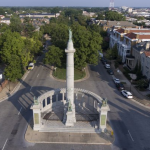Across Virginia

James Fields, Jr.
RICHMOND, Va. (AP) — A state trial will likely be held for a man accused in a deadly car attack on protesters opposing a white nationalist rally in Virginia before he’s tried on federal hate crime charges that carry a possible death penalty. In a joint motion filed Thursday, federal prosecutors and 21-year-old James Alex Fields Jr.’s defense attorneys said they need time to prepare for the “complex” federal case. The two sides also said that the state trial — scheduled to begin Nov. 26 — and its outcome “may provide information that is material” to a determination by U.S. Attorney General Jeff Sessions whether to seek the death penalty in the federal case.
Fields, of Maumee, Ohio, is accused of killing 32-year-old Heather Heyer and injuring dozens of people on Aug. 12 after a “Unite the Right” rally in Charlottesville by driving his car into a crowd demonstrating against the rally. The event attracted hundreds of white nationalists to the college town where officials planned to remove a statute of Confederate Gen. Robert E. Lee.
Fields faces murder and other charges under Virginia law. Last week, he was indicted on 30 federal charges. Twenty-nine of the counts were brought under a hate crimes law that carries a maximum penalty of life in prison.
The 30th count was brought under a provision of the Civil Rights Act of 1968. It accuses Fields of racially motivated violent interference with a federally protected activity — the use of the public streets and sidewalks of Charlottesville — resulting in death.
The charge can carry the death penalty. Prosecutors have not decided whether to seek it, and the process could take months.
The law requires prosecutors to prove not only that Fields acted because of the actual or perceived race or national origin of members of the crowd, but also that he was motivated by Heyer’s use of the streets and sidewalks of Charlottesville.
Robert Dunham, executive director of the Death Penalty Information Center, said he believes federal prosecutors have agreed to let the state put Fields on trial first because it’s a stretch for them to try to use the hate crimes statute that makes him eligible for the death penalty.
“It makes sense for them to wait until after the state trial because as the facts stand right now, it’s an extremely tenuous death penalty claim,” Dunham said.
“The fact that something is labeled a hate crime doesn’t by itself make it a capital offense. There has to be more. The way the statute is written, on the facts of this case, it’s not clear that there is any basis to seek the death penalty.”
But Jonathan Turley, a professor at the George Washington University Law School, said he believes the decision to hold the state trial first is a good strategic move by prosecutors.
“The state is likely to produce a great deal of evidence that the federal prosecutors do not currently have. In particular, they will be able to see the evidence marshaled by the defense as to the state of mind of Fields,” Turley said.
Fields pleaded not guilty Thursday to the federal charges.

Photo: AP
WASHINGTON (AP) — Lawyers for Paul Manafort, President Donald Trump’s former campaign chairman, asked a federal judge Friday to relocate a criminal trial starting later this month because of pretrial publicity. The financial crimes trial of Manafort is scheduled to start July 25 in Alexandria, Virginia, just outside Washington. But his lawyers argued in court papers Friday that it would be impossible for Manafort to receive a fair trial because of the intense media coverage surrounding his case and special counsel Robert Mueller’s investigation. They asked for the trial to be relocated to the more sparsely populated city of Roanoke in southwest Virginia.
The lawyers say that while the Washington region ranks first in the nation in households with computers and Internet access, “Roanoke is the 70th largest media outlet in the United States and 38% of households in Roanoke lack broadband compared to 3% in Northern Virginia.”
A Google search for news articles about “Russian collusion” turned up 2,900,000 results, and thousands of articles have been focused on Manafort.
“Reviewing these articles, one is hard pressed to find any that are not unfavorable to Mr. Manafort,” the defense lawyers say.
In addition, they say, voters in the Virginia region where jurors would be drawn from voted 2-1 in favor of Democratic presidential candidate Hillary Clinton, Trump’s opponent, while “this split is more balanced” in Roanoke.
“Nowhere in the country is the bias against Mr. Manafort more apparent than here in the Washington, D.C. metropolitan area,” they wrote.
Manafort is awaiting trial in Virginia this summer and in federal court in Washington this fall.
He faces charges related to his work for pro-Russia Ukrainian political interests. The charges don’t relate to the core focus of the Mueller investigation — potential coordination between the Trump campaign and Russia — and prosecutors said in a court filing that they do not intend to raise allegations of collusion. But they do say they plan to present evidence that a bank executive who approved a loan to Manafort expressed interest in working on the Trump campaign, told Manafort about that interest and eventually secured a position advising the Trump campaign.
“In short,” prosecutors wrote, “the defendant’s role with the Trump campaign is relevant and inextricably intertwined with the Lender D bank fraud and bank fraud conspiracy charges. Here, it would be difficult for the jury to understand why the loans were approved without understanding that the lender approved the loans, in spite of the identified deficiencies, because the senior executive factored in his own personal ambition.”
Manafort was jailed last month after a federal judge revoked his house arrest over allegations of witness tampering in Mueller’s investigation.
Defense lawyers said in court papers Thursday that Manafort is locked in a jail cell in Virginia for 23 hours a day, excluding visits from his attorneys, and has been in solitary confinement because the facility can’t guarantee his safety. The lawyers are asking a federal appeals court to overturn the judge’s order and release him under certain conditions as he awaits trial.
The lawyers said his detention makes it “effectively impossible” for Manafort to prepare for trial. They said the judge, Amy Berman Jackson, did not analyze carefully enough whether Manafort had actually committed witness tampering.
“Independently, the alleged evidence of obstruction is so thin that it cannot reasonably support the determination that no set of conditions could ensure Mr. Manafort’s appearance and the safety of the community,” Thursday’s court filing states.
Manafort is one of four Trump campaign or White House aides to have been charged in Mueller’s investigation. Three others — George Papadopoulos, Michael Flynn and Rick Gates — have pleaded guilty and agreed to cooperate with investigators.
 A driver who struck a dog and returned to check on its condition was then struck and killed by another vehicle. It happened shortly before sunrise this morning on Peppers Ferry Road, near the Radford Army Ammunition Plant in Montgomery County. The sheriff’s office says 50-year-old Leslie Ratcliff of Hiwassee died at the scene. Officials say the second driver remained there and has been fully cooperative.
A driver who struck a dog and returned to check on its condition was then struck and killed by another vehicle. It happened shortly before sunrise this morning on Peppers Ferry Road, near the Radford Army Ammunition Plant in Montgomery County. The sheriff’s office says 50-year-old Leslie Ratcliff of Hiwassee died at the scene. Officials say the second driver remained there and has been fully cooperative.
Bellamy Malaki Gamboa
From News Release: The Virginia State Police has issued a critically missing adult alert on behalf of the Virginia Beach Police Department on 07/05/2018 at 1801 hours.
The Virginia Beach Police Department is looking for Bellamy Malaki Gamboa, an Asian female, 39 year old, height 5’01”, weight 135 lbs, with brown eyes, and black hair. She has a tattoo of a band of roses on her right arm and “Bellamy” tattooed on her right ankle.
She is believed to have been abducted and in danger. She was last seen on 07/01/2018.
Please contact the Virginia Beach Police Police Department at 1-757-385-8175 if located.
You may find complete information at http://www.vasenioralert.com/

James Fields
CHARLOTTESVILLE, Va. (AP) — A man has pleaded not guilty to federal hate crime charges in a deadly car attack on a crowd of protesters opposing a white nationalist rally. James Alex Fields Jr. of Maumee, Ohio, made his initial appearance Thursday during a brief hearing in U.S. District Court in Charlottesville after being charged last week with 30 federal crimes in the Aug. 12 attack that killed 32-year-old Heather Heyer and injured dozens more. He also is charged under Virginia law with murder and other crimes. Fields wore a gray striped jumpsuit and sat quietly, giving brief answers to the judge’s questions. His attorneys made no request for bail. One of the federal charges Fields faces carries the death penalty, although prosecutors haven’t announced whether they will seek that punishment.
 RICHMOND, Va. (AP) — It can start with a couple of traffic tickets. Unable to pay the tickets right away, a driver becomes saddled with late fees, fines and court costs. Soon, the driver may be taken off the road indefinitely. More than 40 states allow the suspension of driver’s licenses for people with unpaid criminal or traffic court debt. But now, advocates across the country are pushing to change that, arguing that such laws are unconstitutional because they unfairly punish poor people and violate due process by not giving drivers notice or an opportunity to show they cannot afford to pay the fees. Lawsuits have been filed in at least five states over the past two years.
RICHMOND, Va. (AP) — It can start with a couple of traffic tickets. Unable to pay the tickets right away, a driver becomes saddled with late fees, fines and court costs. Soon, the driver may be taken off the road indefinitely. More than 40 states allow the suspension of driver’s licenses for people with unpaid criminal or traffic court debt. But now, advocates across the country are pushing to change that, arguing that such laws are unconstitutional because they unfairly punish poor people and violate due process by not giving drivers notice or an opportunity to show they cannot afford to pay the fees. Lawsuits have been filed in at least five states over the past two years.
“It’s not that I don’t want to take care of what I owe. I really wish I could,” said Brianna Morgan, a single mother from Petersburg, Virginia, who hasn’t had a license in three years because she owes more than $400 in traffic fines and court costs from traffic violations and a disorderly conduct citation. “I really don’t have a way to pay it,” said Morgan, who supports herself and her three children on a monthly disability check.
Advocates had a victory this week in Tennessee, where a federal judge ruled that a law that allows the state to revoke the licenses of low-income people with unpaid court debt from past criminal convictions is unconstitutional. U.S. District Judge Aleta Trauger called the law “powerfully counterproductive” and ordered Tennessee to stop revoking licenses and to reinstate the licenses of people who had theirs revoked due solely to nonpayment of court fees. “If a person has no resources to pay a debt, he cannot be threatened or cajoled into paying it; he may, however, become able to pay it in the future. But taking his driver’s license away sabotages that prospect,” Trauger wrote in her ruling Monday.
In Virginia, nearly a million people currently have suspended driver’s licenses at least in part because of unpaid court debt, according to the Legal Aid Justice Center, a nonprofit that is challenging the practice in a federal lawsuit. A judge dismissed the case on jurisdictional grounds, but in a ruling in May, the 4th U.S. Circuit Court of Appeals gave the case new life, sending it back to the lower court to allow the plaintiffs to revise the lawsuit.
Millions of drivers nationwide have lost licenses because of such laws. In a study released in September, the justice center estimated that 4.2 million people then had suspended or revoked licenses for unpaid court debt in five states alone: Virginia, Tennessee, Michigan, North Carolina and Texas.
Lawsuits are pending in North Carolina, Montana and Michigan, in addition to Virginia and Tennessee. In California, legislation enacted last year prohibits state courts from suspending driver’s licenses simply because of unpaid traffic fines.
But supporters of the laws say people who violate traffic laws must be held accountable.
Virginia Republican state Sen. Bill Carrico said the threat of losing a license can provide incentive to pay fines.
“If we don’t suspend driver’s licenses, then people will say, ’I’m not going to pay the fine,’” Carrico said. “That’s a slippery slope.”
A separate lawsuit still pending in Tennessee challenges a law that allows the state to take away the driver’s licenses of people with unpaid traffic debt.
For Ashley Sprague, a 27-year-old mother of five from Lebanon, Tennessee, who is a plaintiff in that case, the thought of paying $946 in traffic debt, plus $388 to get her license reinstated, was overwhelming.
Her debt began in 2015 after she got a citation for speeding and failure to have proof of insurance. At the time, she made $2.13 an hour, plus tips, as a waitress at Waffle House.
Sprague said she couldn’t afford to pay and lost two jobs while her license was suspended because she had to rely on other people to get to work.
In the Virginia case, Judge Roger Gregory, chief justice of the 4th U.S. Circuit Court of Appeals, wrote that the state’s system does not differentiate between those unable to pay from those unwilling to pay.
“By suspending the licenses of those who cannot pay for reasons outside of their control, the state traps thousands of Virginians in a nightmarish spiral for which there is no apparent exit,” Gregory wrote.
But Jonathan Turley, a professor at George Washington University Law School, said he thinks it’s unlikely the lawsuits will succeed in getting other states to stop suspending licenses for nonpayment of fees.
“There’s no question that suspension for failure to pay a fine is the hardest on those who cannot pay the fine, but courts will be concerned about the slippery slope narrative,” Turley said.
“If there is a constitutional barrier to the suspension of licenses for failure to pay a fine, where does that right begin and end? Does that apply to all permits and licenses?”
 FAIRFAX, Va. (AP) — A mistake worthy of a Cheech and Chong skit has left a man under arrest in northern Virginia on drug-distribution charges. Fairfax County Police say a man who dialed the wrong number sent a text last week to one of their officers offering to sell marijuana. Police say narcotics detectives took it from there. The detectives scheduled a meeting and the man was arrested in possession of more than a pound of marijuana. Officers found another pound of marijuana after obtaining a warrant and searching his home. Police did not release the man’s name. He’s been charged with possession with intent to distribute.
FAIRFAX, Va. (AP) — A mistake worthy of a Cheech and Chong skit has left a man under arrest in northern Virginia on drug-distribution charges. Fairfax County Police say a man who dialed the wrong number sent a text last week to one of their officers offering to sell marijuana. Police say narcotics detectives took it from there. The detectives scheduled a meeting and the man was arrested in possession of more than a pound of marijuana. Officers found another pound of marijuana after obtaining a warrant and searching his home. Police did not release the man’s name. He’s been charged with possession with intent to distribute.
 ROANOKE, Va. (AP) — A judge is set to hold a status conference in a federal civil-rights lawsuit filed on behalf of immigrant teens who allege they were severely abused inside a Virginia juvenile detention center.
ROANOKE, Va. (AP) — A judge is set to hold a status conference in a federal civil-rights lawsuit filed on behalf of immigrant teens who allege they were severely abused inside a Virginia juvenile detention center.
The Associated Press reported last month on sworn statements from six Latino teens who detailed abuse they said they endured at the Shenandoah Valley Juvenile Center.
The teens said they were beaten while handcuffed, locked up for long periods in solitary confinement, and left nude and shivering in concrete cells.
Lawyers for the detention facility have denied all allegations of physical abuse.
U.S. District Judge Elizabeth Dillon has scheduled a telephone conference call Tuesday to get an update on the case from lawyers for both sides.
Gov. Ralph Northam has ordered state officials to investigate the claims.
 If you are hitting the highways for a summer road trip, you will be paying a lot more than way the case one year ago; U.S. gas prices are about 54 cents a gallon higher than they were last year at this time. But experts say without greatly increased U.S. oil production, those fill-ups would cost substantially more, as WFIR’s Evan Jones reports:
If you are hitting the highways for a summer road trip, you will be paying a lot more than way the case one year ago; U.S. gas prices are about 54 cents a gallon higher than they were last year at this time. But experts say without greatly increased U.S. oil production, those fill-ups would cost substantially more, as WFIR’s Evan Jones reports:

AP Photo
RICHMOND, Va. (AP) — A commission studying what to do with the most prominent Confederate monuments in Richmond, Virginia, recommended Monday removing one honoring Confederate President Jefferson Davis. The panel of historians, local officials and others that spent around a year studying and soliciting public input about the statues on the city’s historic Monument Avenue also urged the addition of permanent signage with historical context near the monuments. Further, leaders should add new monuments that would reflect a “more inclusive” story of the city’s history, the commission said in a more than 100-page report. “In the course of the work, it became abundantly clear the majority of the public acknowledges Monument Avenue cannot and should not remain exactly as it is. Change is needed and desired,” said the report, which is not legally binding.
Richmond, a former capital of the Confederacy, has some of the largest and most prominent Confederate monuments in the United States, where a mass shooting at a black church in South Carolina and a white nationalist rally in Charlottesville have heightened a national debate over whether such symbols should remain on display.
The commission studied what to do with the five soaring Confederate statues that dot Monument Avenue, a prestigious residential street lined with mansions and divided by a grassy median.
The Davis statue “is the most unabashedly Lost Cause in its design and sentiment,” the report said in a reference to an interpretation of the war that historians say romanticizes the South and de-emphasizes the role of slavery.
An inscription on the Davis monument, for instance, “styles the Confederate president as a ‘Defender of the Rights of States,’” the report noted.
That monument should be removed, pending litigation or changes in state law, said the report, which suggested that one part could be relocated to Davis’ grave at Richmond’s Hollywood Cemetery.
A state law currently on the books, which the Republican-controlled General Assembly has shown no appetite for changing, prohibits local governments or others from “disturbing or interfering with” memorials to war veterans. The statute is at the center of a lawsuit playing out in Charlottesville over that city’s effort to remove two Confederate statues.
Richmond Mayor Levar Stoney said in a statement that he would be studying its recommendations further before taking any other steps, though he said he agreed with the report’s finding that “something needs to change.”
“Richmond has a long, complex and conflicted history, and the Confederate statues on Monument Avenue represents a shameful part of our past,” Stoney said. “As I have said before, the statues on this beautiful street are Lost Cause myth and deception masquerading as history. They are monuments to Jim Crow that do not reflect the qualities of inclusivity, tolerance and equality we celebrate as values in our city today.”
When Stoney first announced the formation of the commission, he said the statues should not be taken down but should be supplemented with historical context about why they were built. But after a white nationalist rally in Charlottesville last summer descended into violent chaos, the mayor expanded the panel’s mandate to include removal as a possibility.
While the Richmond commission completed its work and a similar study took place in Louisville, Kentucky, many other U.S. cities moved more quickly after the Charlottesville rally to take down their Confederate statues or symbols.
For instance, four Confederacy-related monuments were hauled away in Baltimore just days after the rally.
In Memphis, Tennessee, city leaders used a legal loophole to get around a state law protecting historical memorials by selling the city parks where three Confederate leaders stood to a nonprofit, which swiftly removed the monuments under the cover of darkness.
The panel in Louisville, Kentucky, released a report Saturday saying public displays honoring the Confederacy were unwelcome and not representative of the city today.
In Richmond, the first monument, honoring Gen. Robert E. Lee, was erected in 1890, decades after the end of the Civil War.
The other statues — to Davis, J.E.B. Stuart, Thomas “Stonewall” Jackson and Matthew Fontaine Maury, an oceanographer and commander in the Confederate Navy — were raised in the early 20th Century, when Jim Crow laws were eroding the rights of black citizens.
A statue of black tennis hero Arthur Ashe, a Richmond native, was added to Monument Avenue in 1996, provoking a nationally publicized and racially charged dispute.
One of the panel’s suggestions was to commission a monument dedicated to soldiers of the United States Colored Troops, regiments of mostly formerly enslaved men who fought for the Union.
“The juxtaposition to the Confederate Statues could be a powerful statement,” the report said.







